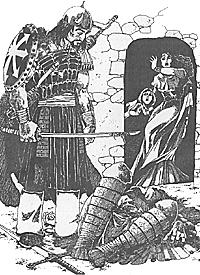
Suddenly Boris found himself standing in a dark room. Instinctively, he reached for his sword, only to find that it was no longer there. A man stepped from the darkness and walked around the bulky fighter, looking at him from every angle. Then he stopped, and stared Boris in the eye.
"Well, looks like you've done pretty well for yourself since we met."
Boris squinted at him. "You look familiar. Have we met?"
The man chuckled. "In a sense. You're the one who killed me..."
The majority of role playing games involve combat. Most of the time, this combat leads to somebody's death, usually the death of beings other than the players. Brutal, bloody fights can make an exciting adventure, but does anyone think about what happens afterwards?
There are a number of consequences which can occur after a person is killed in a role playing adventure. If the players kill a person who was simply a guard protecting some treasure or a powerful sorcerer, that person's death could be seen as an act of murder. Before the players know it, the local law-enforcement agencies could be breathing down their necks, asking some very difficult questions. If your campaign involves magic, drugs, or devices which can distinguish truth from lies, the players could be in deep trouble.
"So tell me, Boris. How does it feel to kill a man who may have had a family who depends on him, or a lover who needed him. Maybe he ran a local orphanage in his spare time, and now the children there are going hungry."
Boris rocked back and forth on his back, his hands covering his ears. "This can't be happening... you're dead, you can't come back ... you're dead."
The man lunged forward, his eyes flaring. "Yes, I am dead, and I can't come back. But you have never been able to forget what you did to me. You have never forgiven yourself for the atrocities you have committed."
Another possible occurrence, if your campaign involves magic (or clones), is to have the victim come back from the dead to seek revenge on his or her killer. The obvious, and stereotypical way of doing this is for the un-deceased person to seek to kill the player. But it may actually be more interesting if the person haunted the player's dreams and memories, or turned the family of the player's character against him, or her. Revenge can be a variety of things, and not just limited to death. What if the player tried talking to a king, asking permission to hunt bad guys and collect their treasure, but a little voice inside the head of the king says not to trust him...
Every person has a family, and this can also be used in adventures to make players possibly feel guilty about what they have done, and to convince them to be a little more selective in the people they kill.
Suppose the players just defeat a man who was guarding a large building. just as he falls lifeless to the ground, a woman runs out of the building, sobbing and screaming. She kneels by the man, cradling his head in her lap and wiping away the blood. From the doorway, two dirty little children watch with teary eyes. The woman looks up at the players and cries, "You killed my husband, you evil people! He's dead. you killed him!" If the players don't do something to help support this family, they could be condemning the family to a life of poverty and an all too early death.
The players may also need to keep a good reputation up. How many towns would accept a group of people notorious for indiscriminate killing?
Boris rolled on the ground with his hands aver his head, crying. His friends looked at each other in confusion. Fernandes nudged Inago and whispered, "What's wrong with him?"
With all this bloodshed, the character is bound to feel something, especially if he or she is supposed to be a good character. They could be constantly awakened by nightmares, seeing the people they have killed over and over in their minds, except each time the dreams get a little more gruesome and frightening. Eventually, they may not want to sleep at all. The player could also be haunted by the memories of what they have done, and remember the face of every person they killed just as they gave their list dying breath. While taking notes or writing 'something, the player is unable to concentrate on anything except the last words of the victims who had fallen under his weapon.
There are many ways to free a player from the burden of what they have done. From supporting a grieving family, to apologizing to undead spirits, to many other options only the GM could know. But the way to free the player's character from this should be personal and important, and may even shed a new light on how the player sees role playing games.
Boris looked up at the man, tears running down his face. "I'm sorry! I really am. I was just doing a job, and I wasn't thinking. Please ... I'm sorry..."
The man stared at the huddled form for a long time, then slowly nodded. "I accept your apology. It's all I was waiting for. But remember, I wasn't the one who forgave you. You've forgiven yourself."
Boris woke up to see his fiiends staring at him. Inago helped Boris to his feet. "Are you all rot, Boris?"
Boris smiled at his friend. "Yes, I am now."
Back to Shadis #20 Table of Contents
Back to Shadis List of Issues
Back to MagWeb Master List of Magazines
© Copyright 1995 by Alderac Entertainment Group
This article appears in MagWeb (Magazine Web) on the Internet World Wide Web.
Other military history articles and gaming articles are available at http://www.magweb.com